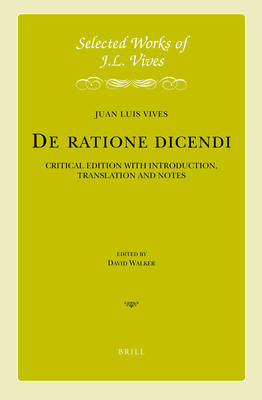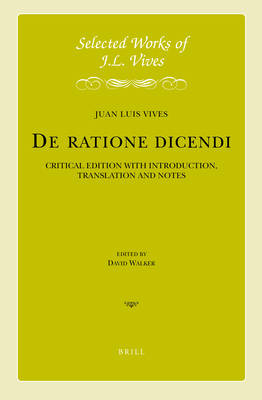
- Afhalen na 1 uur in een winkel met voorraad
- Gratis thuislevering in België vanaf € 30
- Ruim aanbod met 7 miljoen producten
- Afhalen na 1 uur in een winkel met voorraad
- Gratis thuislevering in België vanaf € 30
- Ruim aanbod met 7 miljoen producten
Zoeken
Omschrijving
Juan Luis Vives' 1533 treatise on rhetoric, De ratione dicendi, is a highly original but largely neglected Renaissance Latin text. David Walker's critical edition, with introduction, facing translation and notes, is the first to appear in English.
The conception of rhetoric which Vives elaborates in the De ratione dicendi differs significantly from that which is found in other rhetorical treatises written during the humanist Renaissance. Rhetoric as Vives conceives it is part of the discipline of self-knowledge, and involves a distinct way of thinking about the way kinds of rhetorical style manifested modes of human life. Moving as it did from the concrete particulars of a man's style to their abstractable implications, the study of rhetoric was for him a form of moral thinking which enabled the student to develop a critical framework for understanding the world he lived in.
The conception of rhetoric which Vives elaborates in the De ratione dicendi differs significantly from that which is found in other rhetorical treatises written during the humanist Renaissance. Rhetoric as Vives conceives it is part of the discipline of self-knowledge, and involves a distinct way of thinking about the way kinds of rhetorical style manifested modes of human life. Moving as it did from the concrete particulars of a man's style to their abstractable implications, the study of rhetoric was for him a form of moral thinking which enabled the student to develop a critical framework for understanding the world he lived in.
Specificaties
Betrokkenen
- Auteur(s):
- Vertaler(s):
- Uitgeverij:
Inhoud
- Aantal bladzijden:
- 508
- Taal:
- Engels
- Reeks:
- Reeksnummer:
- nr. 11
Eigenschappen
- Productcode (EAN):
- 9789004354760
- Verschijningsdatum:
- 9/11/2017
- Uitvoering:
- Hardcover
- Formaat:
- Genaaid
- Afmetingen:
- 155 mm x 239 mm
- Gewicht:
- 839 g

Alleen bij Standaard Boekhandel
+ 409 punten op je klantenkaart van Standaard Boekhandel
Beoordelingen
We publiceren alleen reviews die voldoen aan de voorwaarden voor reviews. Bekijk onze voorwaarden voor reviews.








